As a responsible dog owner, you probably keep a close eye on your furry friend’s behavior and health. So when you notice something unusual in their poop, like hair, it’s completely normal to be concerned. In fact, many dog owners have wondered why their dog pooped hair at some point in their pet’s life. There are many reasons why dogs may have hair in their stool, but before we dive into the causes and treatments, let’s first understand what dog hair is.
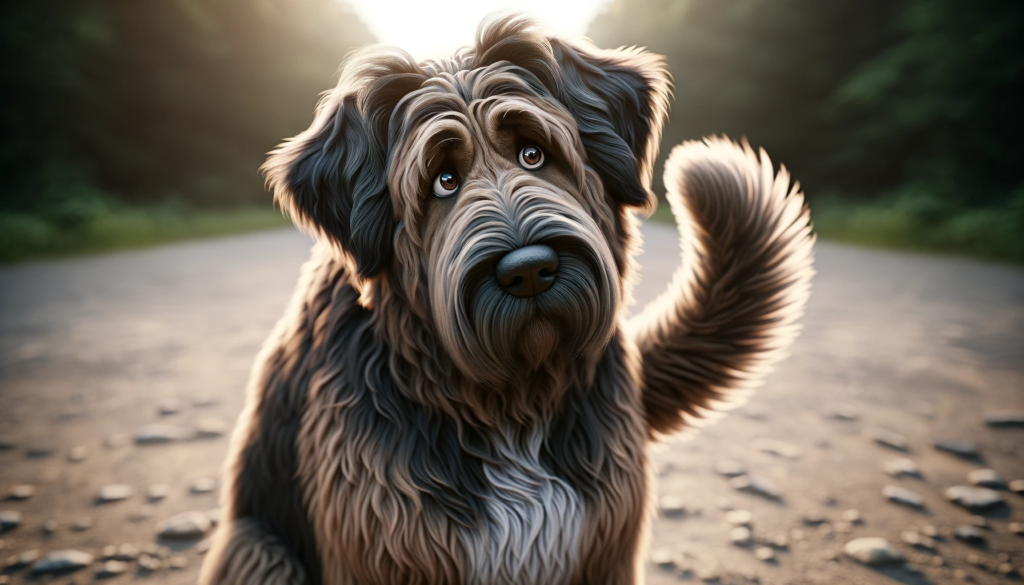
Understanding Dog Hair
Dog hair comes in different types and lengths depending on the breed. For example, a Golden Retriever has long hairs that are meant to protect them from water while swimming.
On the other hand, pugs have short hairs that don’t offer much protection but help them regulate body temperature. All dogs have two types of hair: undercoat and guard hairs.
Undercoat is soft and fluffy fur that helps keep them warm while guard hairs are long strands of stiff fur that protect the skin against external damage. Dogs shed their fur regularly as part of their natural growth cycle.
Shedding is important because it helps remove old or damaged fur and make way for new growth. However, excessive shedding can cause dogs to ingest too much hair which could lead to the development of matted clumps or even serious health complications.
In addition to shedding naturally, there are other ways for dogs to ingest too much hair such as if they groom themselves excessively or consume human hair lying around the house. Now that you know more about dog hair let’s dive into the main topic – why do some dogs poop out hair?
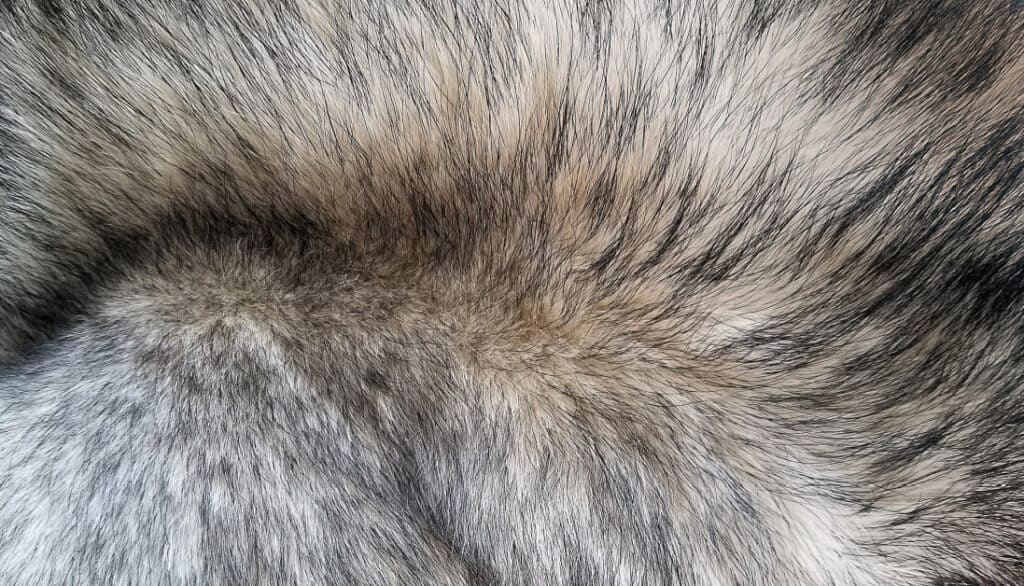
Understanding Dog Hair
The Different Types of Dog Hair
When it comes to dog hair, there are several different types that you may see on your pooch. The first type is the undercoat, which is made up of short, fluffy hairs that help regulate a dog’s body temperature.
Some breeds have double coats, which means they have both an undercoat and a topcoat of longer guard hairs. The second type of hair is known as guard hairs.
These are the longer, coarser hairs that make up a dog’s outer coat. Guard hairs provide protection from the elements and can help deter insects and other pests.
Some dogs also have whiskers or vibrissae. These are long sensory hairs typically found around a dog’s muzzle and are used to help them sense their environment.
Shedding and How Much Hair a Dog can Lose in a Day
All dogs shed to some extent, but some breeds shed more than others. For example, heavy shedders like German Shepherds or Huskies may lose large amounts of hair year-round, while breeds like Poodles or Bichon Frises shed very little. On average, most dogs will lose between 50-100 hairs per day.
This may not sound like much until you consider how many dogs there are in the world! With so many pups shedding every day, it’s no wonder why we sometimes find clumps of fur all over our homes.
However, excessive shedding can be a sign of underlying health issues such as allergies or hormonal imbalances. If you notice your dog losing more hair than usual or bald patches on their skin, it’s important to consult with your veterinarian to rule out any potential problems.
Regular grooming can also help reduce shedding by removing loose hair before it has a chance to fall out on its own. Brushing your dog daily can also help distribute natural oils throughout their coat, keeping it healthy and shiny.
Understanding the different types of dog hair and how much they shed is important for any dog owner. By knowing what to expect from your pooch’s coat, you can better prepare for the inevitable furry mess that comes with owning a dog.
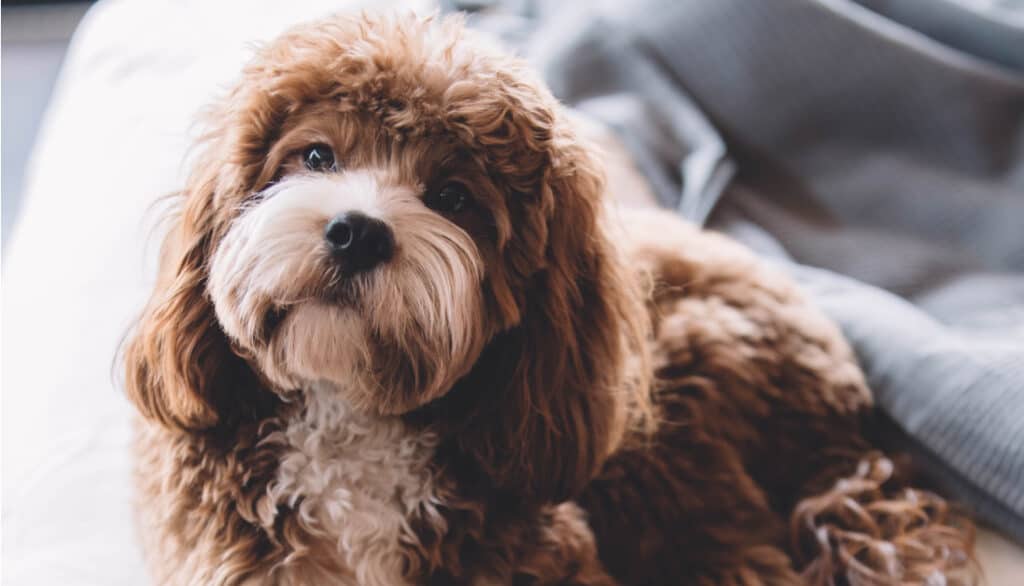
Causes of Hair in Dog Poop
Where is that hair coming from?
Do you ever look down at your dog’s poop and think, “Why is there so much hair in here?” It may be a mystery to you, but there are actually several possible reasons why your dog may be pooping out hair. One common reason is that they are ingesting their own fur during grooming.
This happens because dogs don’t have the ability to spit out the hair like humans do when they get a hair in their mouth. Another cause of hair in dog poop is eating human hair.
Dogs can be sneaky little scavengers and may eat anything they find laying around the house, including hair from brushes or clumps left on the floor. This can lead to an excess of hair being passed through their digestive system and ending up in their poop.
Monitoring your Dog’s Behavior
It’s important to keep an eye on your dog’s behavior to determine if they are ingesting too much fur. If you notice excessive grooming or licking, it could be a sign that they are consuming too much fur during the process. Additionally, if you notice any changes in their appetite or bowel movements, it could indicate an underlying health issue.
You should also keep track of any changes in your dog’s diet as this can affect how much fur they shed and how often they groom themselves. A diet lacking in proper nutrients can lead to dry skin and increased shedding which means more fur for them to ingest.
The Importance of Regular Grooming
Regular grooming can also help prevent excessive amounts of fur being ingested by your pet. Brushing them frequently helps remove loose hairs before your dog has the chance to swallow them while grooming themselves later.
If you have a long-haired breed like a Golden Retriever or a Cocker Spaniel, you may need to groom them more frequently to prevent mats from forming. These mats can trap dead hair and prevent it from being removed during normal grooming.
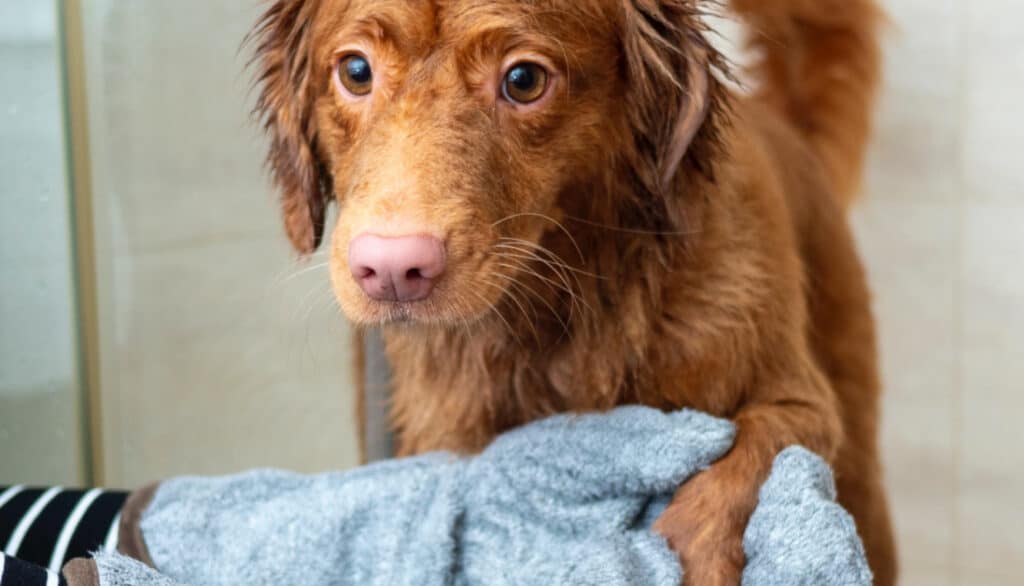
The Role of Digestive Problems
If your dog is consistently pooping out hair, it could indicate a larger issue with their digestive system. For example, if they are not digesting food properly or have an obstruction in their digestive tract, it can cause undigested fur to pass through with their stool.
Other issues such as allergies or inflammation in the gut can also contribute to excessive shedding and hair in your dog’s poop. If you notice any concerning changes in your pet’s poop, be sure to consult with a vet to rule out any serious health problems.
There are several possible reasons why your dog may be pooping out hair. From ingesting their own fur during grooming to eating human hair found around the house, it’s important to monitor your dog’s behavior and diet if you notice excessive amounts of fur in their poop.
Regular grooming can also help prevent this issue from occurring in the first place. Remember that excessive shedding and hair in your dog’s poop could indicate a larger health concern so be sure to consult with a veterinarian if you notice any concerning changes.
Health Concerns
The Connection Between Excessive Hair in Dog Poop and Health Issues
As a responsible pet owner, it’s important to keep an eye on your dog’s poop. Not only does it help you keep track of their digestive health, but it can also indicate underlying health issues. One such issue is the presence of excessive hair in your dog’s poop.
If you notice that your furry friend is pooping more hair than usual, it could be a sign of gastrointestinal problems or allergies. Dogs with sensitive stomachs might struggle to digest certain types of food, leading to irritation and inflammation in their intestines.
In severe cases, this could result in diarrhea or constipation accompanied by excessive hair in their poop. Allergies are another potential cause of excessive hair in dog poop.
Just like humans, dogs can have allergic reactions to certain foods, environmental factors or even parasites like fleas or ticks. An allergy that affects the gut may cause irritation and inflammation within the digestive tract that can lead to an increase in shedding and hair excretion.

The Importance of Consulting a Veterinarian
If you notice any concerning changes in your dog’s poop such as blood or mucus along with excessive hair shedding, you should not hesitate to consult with a veterinarian for further examination. A vet will conduct tests to determine whether there are any underlying health issues contributing to this problem.
They will also be able to provide treatment options once they identify what exactly is causing the issue. In many cases, dietary changes and medication are effective remedies for resolving gastrointestinal problems and allergies that may be causing your dog’s pooch problem with excess hair shedding.
Other Health Issues That Can Result From Excessive Hair Shedding:
Apart from diarrhea and constipation mentioned earlier as common effects when there’s too much hair coming out when your canine goes potty, there are other potential health problems to watch out for when this occurs over time. For example:
- Hairballs: When hair accumulates in a dog’s stomach, it can form hairballs that can cause blockages in their intestines which can be fatal if left untreated.
- Skin irritation: Dogs shedding too much hair may experience itchiness and discomfort brought about by skin inflammation. This can lead to other problems such as sores or infections if the affected areas are not well taken care of.
- Dehydration: Excessive pooping with excessive hair shedding could lead to dehydration.
This is especially true when your pet has diarrhea which results in frequent bowel movements that increase fluid loss. Excessive shedding of hair by dogs into their poop could be a sign of underlying health issues.
It’s important to monitor your dog’s poop and seek veterinary advice should you notice any concerning changes like blood, mucus or frequency changes accompanied by excess shedding of fur in their stool. Consulting a vet early enough is key as they will help find the root cause and recommend appropriate treatments or preventatives necessary to keep your furry friend healthy and happy for years to come.
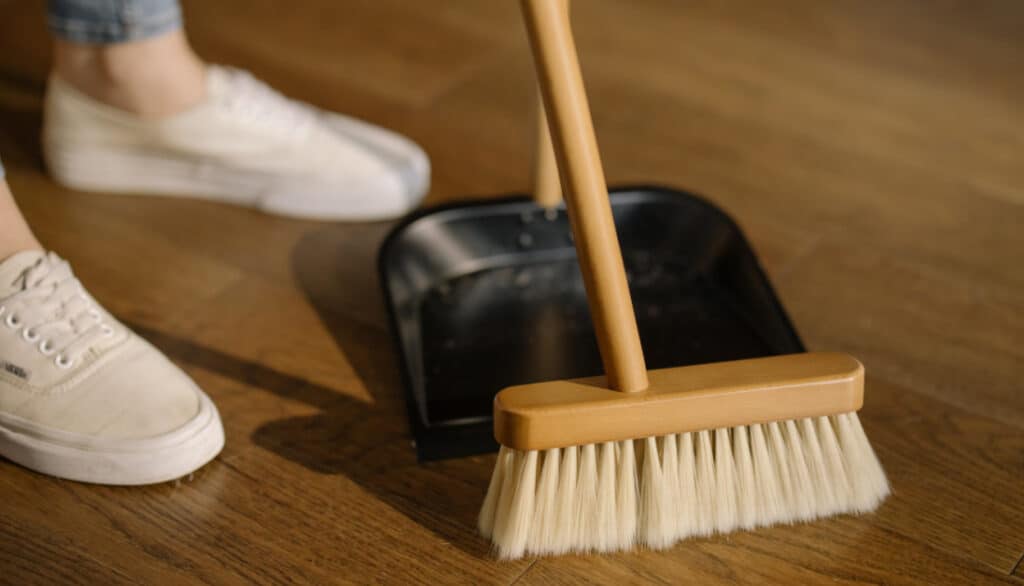
Preventing Your Dog from Ingesting Too Much Hair
As a responsible dog owner, you want to ensure that your furry friend is healthy and happy. One way to do this is by preventing your dog from ingesting too much hair.
Here are some tips:
- Regular Grooming – Regular grooming is essential for maintaining your dog’s coat and preventing excessive shedding. Brushing your dog’s fur every day will help remove loose hair before it has a chance to be ingested. Use a high-quality brush or comb that is appropriate for your dog’s coat type.
- Proper Diet – A proper diet can also help prevent excessive shedding and the ingestion of hair in dogs. Make sure you are feeding your dog high-quality food that contains all the necessary nutrients for a healthy coat and skin.
- Keep Your Home Clean – Keeping your home clean is important for both you and your dog’s health. Regularly vacuuming and dusting will help reduce the amount of loose hair in the air, which can be ingested by dogs.
Treating Underlying Health Issues
If you notice that there is an excessive amount of hair in your dog’s poop, it could be an indication of an underlying health issue that needs to be addressed. Here are some suggestions for treating these issues:
- Gastrointestinal Problems – Gastrointestinal problems, such as inflammatory bowel disease or parasites, can cause excessive shedding and hair in the stool of dogs. If you suspect that this may be the case with your furry friend, consult with a veterinarian who can provide guidance on appropriate treatment options.
- Allergies – Allergies are another common cause of excessive shedding and hair in the stool of dogs. If you suspect that your dog has allergies, consult with a veterinarian to determine the cause and appropriate treatment options.
- Hairball Remedies – If your dog is prone to hairballs, there are over-the-counter remedies available that can help pass the hair through their digestive system. Consult with a veterinarian to determine which remedy would be best for your furry friend.
- Surgical Intervention – In some cases, surgical intervention may be necessary to remove hair that has become lodged in your dog’s digestive system. This is typically reserved for extreme cases and should only be considered after consulting with a veterinarian.
- Behavioral Modification – If you notice that your dog is excessively grooming or licking themselves, it may be a sign of anxiety or boredom. Behavioral modification can help address these underlying issues and prevent excessive shedding and ingestion of hair. By following these tips for prevention and treatment, you can help ensure that your furry friend stays healthy and happy for years to come!

Conclusion: Taking Care of Your Furry Friend
After reading this article, you’re now more informed about why dogs may poop hair and what steps you can take to prevent this issue. It’s essential to monitor your dog’s behavior and diet, as well as seek veterinary advice if you notice any concerning changes in their poop. It’s important to take care of your furry friend by following these key points.
Understanding Dog Hair
Firstly, it’s important to understand the different types of dog hair, including undercoat and guard hairs. By regularly grooming your dog, especially during shedding season, you can prevent excessive hair from being ingested. Ensuring a balanced and nutritious diet can also help with shedding.
Causes of Hair in Dog Poop
Secondly, there are various reasons why dogs may poop hair such as ingesting their own fur or eating human hair. Observing your dog’s behavior can help determine the cause. For example, if you notice that they’re excessively licking or grooming themselves, they may be ingesting too much fur.

Health Concerns
Excessive hair in your dog’s poop could be an indication of underlying health issues such as gastrointestinal problems or allergies. It’s important to consult with a veterinarian if you notice any concerning changes in their poop or overall behavior.
Prevention and Treatment
There are several preventative measures that you can take to ensure that your furry friend doesn’t ingest too much hair such as regular grooming, proper diet management and providing ample hydration throughout the day. Also treating any underlying health issues that may be causing excessive hair in their poop is necessary.
Taking Care of Your Furry Friend
for taking care of our furry friends who are just like family members for so many households:
- Monitor your dog closely for any changes in behavior and poop consistency
- Regularly groom your dog, especially during the shedding season
- Maintain a healthy diet rich in nutrition
- Consult with a veterinarian if you notice any concerning changes in your dog’s poop or behavior.
~Lindsie
